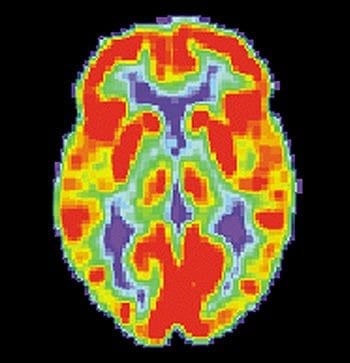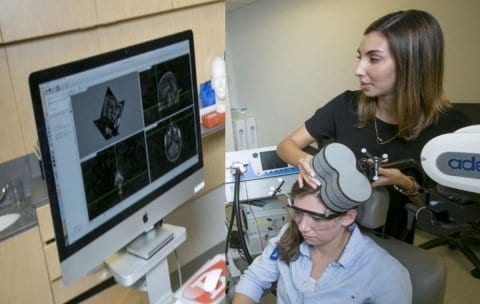
Small trial from UCLA and Buck Institute succeeds using systems approach to memory disorders
Patient one had two years of progressive memory loss. She was considering quitting her job, which involved analyzing data and writing reports, she got disoriented driving, and mixed up the names of her pets. Patient two kept forgetting once familiar faces at work, forgot his gym locker combination, and had to have his assistants constantly remind him of his work schedule. Patient three’s memory was so bad she used an iPad to record everything, then forgot her password. Her children noticed she commonly lost her train of thought in mid-sentence, and often asked them if they had carried out the tasks that she mistakenly thought she had asked them to do.
Since its first description over 100 years ago, Alzheimer’s disease has been without effective treatment. That may finally be about to change: in the first, small study of a novel, personalized and comprehensive program to reverse memory loss, nine of 10 participants, including the ones above, displayed subjective or objective improvement in their memories beginning within 3-to-6 months after the program’s start. Of the six patients who had to discontinue working or were struggling with their jobs at the time they joined the study, all were able to return to work or continue working with improved performance. Improvements have been sustained, and as of this writing the longest patient follow-up is two and one-half years from initial treatment. These first ten included patients with memory loss associated with Alzheimer’s disease (AD), amnestic mild cognitive impairment (aMCI), or subjective cognitive impairment (SCI; when a patient reports cognitive problems). One patient, diagnosed with late stage Alzheimer’s, did not improve.
The study, which comes jointly from the UCLA Mary S. Easton Center for Alzheimer’s Disease Research and the Buck Institute for Research on Aging, is the first to suggest that memory loss in patients may be reversed, and improvement sustained, using a complex, 36-point therapeutic program that involves comprehensive changes in diet, brain stimulation, exercise, optimization of sleep, specific pharmaceuticals and vitamins, and multiple additional steps that affect brain chemistry.
The findings, published in the current online edition of the journal Aging, “are very encouraging. However, at the current time the results are anecdotal, and therefore a more extensive, controlled clinical trial is warranted,” said Dale Bredesen, the Augustus Rose Professor of Neurology and Director of the Easton Center at UCLA, a professor at the Buck Institute, and the author of the paper.
The Latest on: Memory loss
[google_news title=”” keyword=”Memory loss” num_posts=”10″ blurb_length=”0″ show_thumb=”left”]
via Google News
The Latest on: Memory loss
- 'I woke up in hospital with horrific injuries and memory loss then was told my boyfriend did it'on April 26, 2024 at 7:59 pm
Emily Lewis was in so much pain when her boyfriend of three years Thomas Jones attacked her while high on alcohol and drugs that she begged him to kill her ...
- Memory Loss in Alzheimer's Disease: Implications for Development of Therapeuticson April 24, 2024 at 5:00 pm
Knowledge of the anatomical correlates of episodic memory may be critical to delivering anatomically targeted immunotherapies based on the amyloid hypothesis. Scientists developing new drugs for ...
- Long-term stress may lead to memory loss, neurologists warnon April 22, 2024 at 4:59 pm
Neurologists have warned that prolonged exposure to stress can heighten the chances of experiencing anxiety and depression, which in turn raises the risk of memory loss. They explained that during ...
- Recognizing the signs: When a loved one needs memory supporton April 22, 2024 at 4:04 am
Struggling to perform once routine tasks can be a warning sign that a loved one is experiencing memory loss. The Mayo Clinic advises that difficulty with tasks an older adult has performed for years, ...
- 'Queen of Tears' Episode 14 unravels major twist: Kim Ji-won faces memory loss after surgery, while Kim Soo-hyun framed for murderon April 22, 2024 at 3:05 am
In 'Queen of Tears', Hae-in faces memory loss post-surgery as Eun-sung manipulates her against Hyun-woo. Despite chaos, she holds onto hope, recalling ...
- The memory expert who says it's okay to be forgetfulon April 20, 2024 at 4:01 am
Outline A recent survey found that 80 per cent of us worry about memory loss. There are the little annoyances: forgetting the gym locker code or where we left the car keys. Then there are the ...
- 'I have memory loss - I make memos on everyone in my life so I don't forget them'on April 14, 2024 at 8:00 am
Megan, 27, has had to adapt after suffering a traumatic brain injury when she fell off a stage in school and hit the back of her head.
- "I have memory loss - I make memos on everyone in my life so I don't forget them"on April 10, 2024 at 2:30 am
A woman with memory loss makes memos on everyone in her life so she can remember details about them - and has been nicknamed Dory by her friends. Megan Mackenzie, 27, suffered a traumatic brain ...
- Butte's first Memory Café set for Thursday at the libraryon April 9, 2024 at 3:16 pm
Butte’s first Memory Café for people with early-stage memory loss and their care partners will be held at the Butte-Silver Bow Library on Thursday. Memory Cafés promote connection and ...
- What to know about medications for memory losson April 3, 2024 at 5:00 pm
Medications, such as cholinesterase inhibitors and glutamate regulators, can treat memory loss. They can help manage a person’s memory loss symptoms and modify the progression of their condition.
via Bing News









